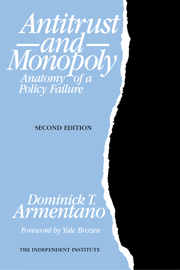With at least 12 compulsory years in public schools, one would think that most of the twenty-something Wall Street protesters would have some understanding of capitalism, its actual history, and its accomplishments. Well, maybe not. One can only wonder what passes for economic education these days.
So what is capitalism? Free market capitalism is based on the individual right to own and freely trade property. It permits owners of property (land, labor, capital, etc.) to enter (or exit) any contract on mutually agreeable terms. It gives entrepreneurs the freedom to start any business (without government permission) and to borrow money and develop products for consumers. It permits land owners to rent (or sell) their property for any peaceful purpose. It gives adult workers the liberty to lease their services to any business at any agreeable wage and to terminate that agreement at will; employers would have the same right.
Capitalism allows firms to compete (and cooperate) with other firms; it allows firms to succeed and reinvest their profits; it allows firms to make losses and fail and go out of business. It allows consumers to choose any product or service and allows parents to educate their children in any manner and for any length of time that they decide is appropriate.
Under capitalism, there would be no government bailouts; no Federal Reserve; no Fannie Mae or Freddy Mac; no state restrictions on competition (so-called antitrust laws); no tax-supported schools and no government supported monopolies of any kind. Crony capitalism, after all, is not real capitalism.
As should be apparent, a capitalistic economic system is grounded on individual liberty. When and if individual rights are violated under capitalism (theft, harmful pollution, contract defaults, protesters breaking store windows) it would be legitimate to prosecute and punish rights-violaters (criminals) under the rule of law.
Now what exactly are the Wall Street protesters protesting? A few are legitimately protesting the special privileges and economic distortions associated with crony capitalism. Fine. Most, however, are confusing crony capitalism with real capitalism. For example, they think corporations are too “powerful” or they are upset about the dearth of jobs (and blame the free market), or they want incomes more evenly “distributed” or, more generally, they want more government control of the marketplace.
Let’s take these one at a time.
Corporations such as Apple and Wal-Mart and Allstate are all large organizations that compete in an open market with other businesses (large and small) for the favor of consumers. Their overall success depends not on any government grant of “power” but solely on their internal efficiency and their ability to convince consumers to purchase their products and services every hour of every day; if they fail, they get smaller, and their employees and investors suffer.
Do the protesters object to growth and success based on efficiency and consumer choice? Would they restrict that choice or hamper that efficiency to keep firms small? And if small is more expensive, why is this good.
Protesters also say that they are concerned about the fact that the jobless rate is stuck at 9%? But whose fault is that? In all previous post WW2 recessions the economy has always recovered and the U.S. job market has always expanded. There are two exceptions: the 1930’s and the last three years. Interestingly, these are the only recessions where Keynesian economic policies were used by the federal government in an attempt to “stimulate” the economy and bailout ailing corporations and financial institutions. I think that there is a lesson here if only the protesters would pay attention.
On the matter of income distribution, let’s be clear: Incomes are not “distributed” but are earned when owners of land, labor, or capital sell or rent their property. The distribution is unequal because the original endowment (talent, inheritance, etc.) is always unequal and because free market prices and wage rates are different for different products and services.
Consumers place a higher value on Lady Gaga’s services than they do on my services and, thus, her income is far higher than mine. Under capitalism, Lady Gaga (certainly a member of the 1% club) is entitled by right to keep what she earns in free trade . . . or give it away if she chooses. By what right would protesters advocate that government confiscate some of that income and “distribute” it to people who didn’t earn it? Sounds like theft and not “social justice” to me.
Notice that the general theme accepted by most of the protesters is that government power is always necessary to correct the free market choices that consumers and businessmen make every day. I say: Get some historical perspective. Nations have tried those sort of regimes for centuries and they have proven both illiberal and inefficient. Real capitalism, is the newest and freest and most productive economic system ever tried and we must salvage, not wreck, what’s left of it. Perhaps a field trip to Greece (or Cuba) for the Wall Street protesters is in order.








